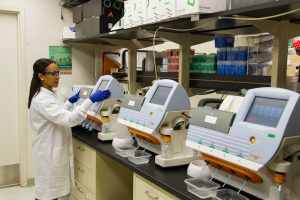The quest to find out what causes HS is an important one. Hidradenitis Suppurativa and genetics are suspected to be linked. Patients report that doctors tell them their lifestyle causes their symptoms. Many of those patients say they feel like their condition is their fault. But no matter what they do, they can’t control it.
At some point, you may decide to explain your condition to your loved ones. Knowing why something happens makes it easier to explain it. And in general, knowledge is empowering. Sadly, nobody knows what causes HS. It’s only recently that research has tried to figure it out. It is likely genetics, biology and environment, together cause HS. There are many types of HS research, but today we are going to focus on hidradenitis suppurativa and genetics.
The Science of Hidradenitis Suppurativa and Genetics

A gene is a piece of information on a chromosome. Different genes occupy points on the chromosome. And the purpose is to decide what traits you have. Everyone has two sets of chromosomes, one from each parent. Autosomes represent 22 of your 23 pairs of chromosomes and are the same for both sexes.
Polygenic traits are the result of more than one gene. A phenotype is how a trait is expressed in you. Mutations in genes cause diseases like HS. Research is currently looking at mutations in a set of genes called Presenilin.
Presenilin is an autosomal dominant gene. Because we have two sets of chromosomes, we also have two sets of genes. Autosomal dominant means that one of the set has the mutation and the other does not. Therefore, only one parent must pass on the mutated gene for you to inherit the disease.
A 2016 review study found a third of patients had a family history of HS. But, if you have no family history of HS, you could be the first. Autosomal dominant genes can form new mutations, called a de novo change.
The authors of a 2019 review felt HS could not be understood by studying genetics alone. For the future, they suggested an integrated approach to look at other biological markers as well.
Pieces of the Puzzle

It is important to know that every scientific study will have a flaw. But we can use the knowledge we take from them collectively. I suppose in that way, scientific knowledge is like genes on a chromosome. Polygenic, meaning they work together to create understanding.
You might ask, what can genetic studies tell us on their own? Genetic studies show us that there may be a genetic risk. From a practical point of view, genetics research is informative because,
- If we know there might be a genetic risk, we can plan for our children.
- Our children will have earlier detection and faster treatment.
- There will be less of a stigma around HS.
- The research also educates doctors so they can give you better advice.
- It will inform more studies that give us more knowledge to work with.
Research tells us that lots of different people have shared experiences. So those shared experiences must be meaningful. For instance, one-third of people with HS have a family member with HS. That will be a big coincidence if genetics is not a contributing factor.
Contributing and risk factors are the takeaway message here. Genetics may be one part of the puzzle, but lifestyle, and other bio influences have roles to play. In the end, the purpose is not meaning but improving lives. So, it is essential to consider the whole person and not one attribute on its own.
About the Author

Shannon Sweeney is a psychology and sociology student from Ireland. She is also living with HS and has a keen interest in lifestyle, wellbeing, and Hidradenitis Suppurativa.


